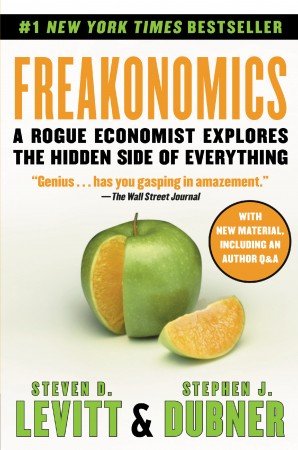Freakonomics - Poverty & Crime

Freakonomics is a brilliant insight into the what the catch really is. Six chapters that look into how conventional wisdom can be wrong and how "experts" bend facts. How do we know how to accurately measure success and performance?
Freakonomics looks at the psychology of money and asks the real questions. Like why do drug dealers live with their mothers if they make so much money?
The book questions and pokes at Levitt's belief that the modern world is not a mystery. If the right questions are ask it's more intriguing than we think. You just need a new perspective.
The below are some takeways from the book which I found very interesting.
1990s America. Crime had been rising consistently over the recent decades. Gunshots, carjacking, robbery, rape and crack dealing had become all too common. Things were about to get worse - according to one man.
In 1995 criminologist James Alan Fox wrote a report for the US Attorney General that proposed his optimistic scenario that teen homicides would increase by 15% in the next ten years.
Clinton turned around and said "We've got about six years to change this juvenile crime thing around or our country will be living with chaos."
Crime didn't go up. It began to fall and fall and fell even more. Experts had anticipated the complete opposite and everyone had their theories - some sounding perfectly logical. Introduction of gun control laws, policing strategies. These theories were encouraging as they attributed initiatives & well paying jobs with crime drops. If all it took was this and to quell crime then we've had this power all along.
The only problem was - this wasn't true.
A woman named Norma McCorvey from Texas would set precedent for millions of women across America.
Norma wanted an abortion. She was a unskilled, uneducated, drug using 21 year old woman who had two children already given up for adoption. The only problem was abortion was illegal in Texas which didn't leave her with much choice.
Norma took her case all the way to the U.S Supreme Court and on 22nd of January 1973 the court ruled in Norma's favor. Sadly by now it was too late and she had already given birth and put the child up for adoption.
Did Roe v. Wade help trigger a crime drop?
It turns out, not all children are born equal. Studies have shown that a child born into an adverse family environment is more likely than other children to become a criminal. The millions of women who could not get access to abortion, either due to financial or legal difficulties - were often models of adversity.
It was nothing to do with gun control. The reality was the pool of potential criminals had dramatically shrunk.
Not one crime drop expert has cited legal abortion as a cause.
This post recieved an upvote from ryankofi. If you would like to recieve upvotes from ryankofi on all your posts, simply FOLLOW @ryankofi
Congratulations @veetz! You have completed some achievement on Steemit and have been rewarded with new badge(s) :
Click on any badge to view your own Board of Honor on SteemitBoard.
For more information about SteemitBoard, click here
If you no longer want to receive notifications, reply to this comment with the word
STOPI had a friend who read Freakonomis when it came out years ago who recommended it, but I never got around to reading it myself.
Interesting correlation (causation ??) concerning legal abortions.
My name is Jess, I typically write about finance, but I've never heard this one. Thanks for sharing!
Same boat myself - has been on my list for ages but put off as I always wanted a physical copy.
I would definitely say causation but it just goes to reaffirm the author's theory that it's not how it always seems from the front. Usually there's a lot more going on behind the scenes or the problems we face should be looked on a global level - i.e does poverty really link to crime? Well let's try using a universal welfare system where you get an allowance regardless of status - does the quality of life improve? I think if we asked the right questions (another key point the authors go on) we might find the answers. Going back to crime - well, we ask why do people commit crime? Necessity? Is it a physical or mental desire? Once we ask the right questions we find the solutions are usually in front of us.
Glad you enjoyed it - I plan to release a mini series on this book, still going through it myself! Upvoted.
Cool! I follow you. +upvote